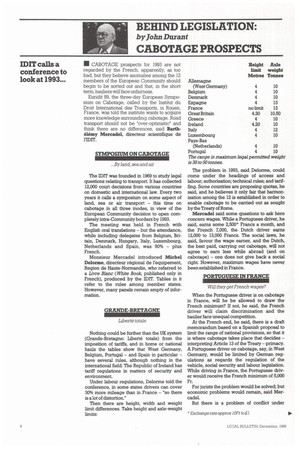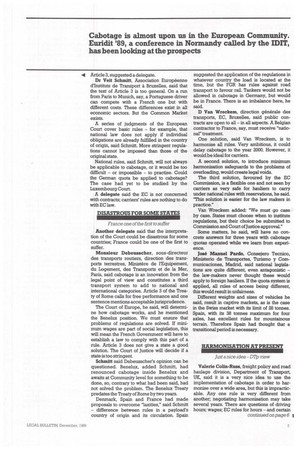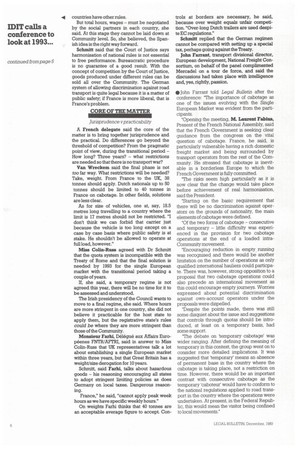BEHIND LEGISLATION:
Page 160

Page 161

Page 162

If you've noticed an error in this article please click here to report it so we can fix it.
by John Durant
CABOTAGE PROSPECTS
IDIT calls a conference to look at 1993...
• CABOTAGE prospects for 1993 are not regarded by the French, apparently, as too bad, but they believe anomalies among the 12 members of the European Community should begin to be sorted out and that, m the short term, hauliers will face unfairness.
Euridit 89, the three-day European Symposium on Cabotage, called by the Institut du Droit International des Transports, in Rouen, France, was told the institute wants to acquire more knowledge surrounding cabotage. Road transport should not be 'over-optimistic" and think there are no differences, said Barthelemy Mercadel, directeur scientifique de 1TDIT.
SYMPOSIUM ON CABOTAGE ...By land, sea and air The EDIT was founded in 1969 to study legal questions relating to transport. It has collected 12,000 court decisions from various countries on domestic and international law. Every two years it calls a symposium on some aspect of land, sea or air transport this time on cabotage in all three modes, in view of the European Community decision to open completely intra-Community borders by 1993.
The meeting was held in French with English oral translations but the attendance, while including delegates from Belgium, Britain, Denmark, Hungary, Italy, Luxembourg, Netherlands and Spain, was 90% plus French.
Monsieur Mercadel introduced Michel Delonne, clirecteur regional de l'eq-uipernent, Region de Haute-Normandie, who referred to a Livre Blanc (White Book, published only in French), produced by the EDIT. Tables in it refer to the rules among member states. However, many panels remain empty of information.
GRANDE-BRETAGNE Liberte totale Nothing could be further than the UK system (Grande-Bretagne: Liberte totale) from the imposition of tariffs, and in home or national hauls the tables show that West Germany, Belgium, Portugal and Spain in particular have several rules, although nothing in the international field. The Republic of Ireland has tariff regulations in matters of security and environment.
Under labour regulations, Delorme told the conference, in some states drivers can cover 30% more mileage than in France "so there is a lot of distortion."
Then there are height, width and weight limit differences. Take height and axle-weight limits: Allemagne (West Germany) 4 10 Belgium 4 10 Denmark 4 10 Espagne 4 13 France no Unlit 13 Great Britain 4.20 10.50 Greece 4 10
Ireland 4.20 10
Italy 4 12
Luxembourg 4 10
Pays-Bas (Netherlands) 4 10 Portugal 4 10 The range in maximum legal permitted weight is 38 to 80 tonnes, The problem in 1993, said Delorme, could come under the headings of access and labour; authorisation; teclutical rules; and tariffing. Some countries are proposing quotas, he said, and he believes it only fair that harmonization among the 12 is established in order to enable cabotage to be carried out as sought by the Treaty of Rome.
Mercadel said some questions to ask here concern wages. While a Portuguese driver, he said, earns some 2,500* Francs a month, and the French 7,000, the Dutch driver earns 12,000 to 13,000 Francs. The social laws, he said, favour the wage earner, and the Dutch, the best paid, carrying out cabotage, will not agree 7o earn less while abroad (and on cabotage) one does not give back a social right. However, maximum wages have never been established in France.
PORTUGUESE IN FRANCE Will they get French wages?
When the Portuguese driver is on cabotage in France, will he be allowed to draw the French minimum? If not, he said, the French driver will claim discrimination and the haulier face unequal competition.
At the French end, he said, there is a draft memorandum based on a Spanish proposal to limit the range of national provisions, so that it is where cabotage takes place that decides interpreting Article 13 of the Treaty primacy. A Portuguese driver on cabotage, say, in West Germany, would be limited by German regulations as regards the regulation of the vehicle, social security and labour legislation. While driving in France, the Portuguese driver would receive the French minimum of 5,000 Fr.
For jurists the problem would be solved; but economic problems would remain, said Mercadel.
But there is a problem of conflict under Exchangerateapprox 'Orr toil 1111 • Article 3, suggested a delegate.
Dr Veit Schmitt, Association Europeenne dinstituts de Transport a Bruxelles, said that the text of Article 3 is too general. On a run from Paris to Munich, say, a Portuguese driver can compete with a French one but with different costs. These differences exist in all economic sectors. But the Common Market exists.
A series of judgments of the European Court cover basic rules for example, that national law does not apply if individual obligations are already fulfilled in the country of origin, said Schmitt. More stringent regulations cannot be imposed than those of the original state.
National rules, said Schmitt, will not always be applicable to cabotage, or it would be too difficult or impossible to practise. Could the German quota be applied to cabotage? The case had yet to be studied by the Luxembourg Court.
A delegate said the EC is not concerned with contracts; carriers' rules are nothing to do with EC law.
DISASTROUS FOR SOME STATES France one of the first to suffer Another delegate said that the interpretation of the Court could be disastrous for some countries; France could be one of the first to suffer.
Monsieur Debensscher, sous-ciirecteur des transports routiers, direction des transports terrestres, Ministere de l'Equipement, du Logement, des Transports et de la Mer, Paris, said cabotage is an innovation from the legal point of view and constitutes a third transport system to add to national and international categories. Article 3 of the Treaty of Rome calls for free performance and one sentence mentions acceptable jurisprudence.
The Court of Europe, he said, will determine how cabotage works, and he mentioned the Benelux position. We must ensure that problems of regulations are solved, If minimum wages are part of social legislation, this will mean the French Government will have to establish a law to comply with this part of a rule. Article 3 does not give a state a good solution. The Court of Justice will decide if a state is too stringent.
Schmitt said Debeusschers opinion can be questioned. Benelux, added Schmitt, had renounced cabotage inside Benelux and awaits at Community level for something to be done, so, contrary to what had been said, had not solved the problem. The Benelux Treaty predates the Treaty of Rome by two years.
Denmark, Spain and France had made proposals to overcome "laxities," said Schmitt difference between rules in a payload's country of origin and its circulation. Spain suggested the application of the regulations in whatever country the load is located at the time, but the FGR has rules against road transport to favour rail. Tankers would not be allowed in cabotage in Germany, but would be in France. There is an imbalance here, he said.
D Van Wreckem, direction generale des transports, EC, Bruxelles, said public contracts are open to all in all aspects. A Belgian contractor to France, say, must receive "national" treatment.
One solution, said Van Wreckem, is to harmonise all rules. Very ambitious, it could delay cabotage to the year 2000. However, it would be ideal for carriers.
A second solution, to introduce minimum harmonisation safeguards to the problems of overloading, would create legal voids.
The third solution, favoured by the EC Commission, is a flexible one and not seen by carriers as very safe for hauliers to carry under national rules with reservations, he said. This solution is easier for the law makers in practice."
Van Wreckem added: 'We must go case by case. States must choose when to institute regulations, but their choice be submitted to Commission and Court of Justice approval?
Some matters, he said, will have no concrete answers for three years with cabotage quotas operated while we learn from experience.
Jose Manuel Pardo, Consejero Tecnico, Ministerio de Transportes, Turismo y Cornrnunicaciones, Madrid, said national legislations are quite different, even antagonistic the law-makers never thought these would apply to foreign hauliers. If the quota system is applied, all rules of access being different, this would result in unfairness.
Different weights and sizes of vehicles he said, result in captive markets, as is the case in the Swiss market with its limit of 28 tonnes. Spain, with its 38 tonnes maximum for four axles, has excellent rules for mountainous terrain. Therefore Spain had thought that a transitional period is necessary.
HARMONISATION AT PRESENT Just a nice idea DTp view Valerie Colin-Rnss, freight policy and road haulage division, Department of Transport, UK, said it is a very nice idea to use the implementation of cabotage in order to harmonise over a wide area, but this is impracticable. Any one rule is very different from another; negotiating harmonisation may take several years. There are questions of driving hours; wages; EC rules for hours and certain But total hours, wages must be negotiated by the social partners in each country, she said. At this stage they cannot be laid down at Community level. So, she believed, the Spanish idea is the right way forward.
Schmitt said that the Court of Justice says harmonisation of national rules is not essential to free performance. Bureaucratic procedure is no guarantee of a good result. With the concept of competition by the Court of Justice, goods produced under different rules can be sold all over the Community. The German system of allowing discrimination against road transport is quite legal because it is a matter of public safety; if France is more liberal, that is France's problem.
CORE OF THE MATTER
Jurisprudence v practicability A French delegate said the core of the matter is to bring together jurisprudence and the practical. Do differences go beyond the threshold of competition? From the pragmatic point of view, during the transitional period How long? Three years? what restrictions are needed so that there is no transport war?
Van Wreckem said the final phase is not too far way. What restrictions will be needed? Take, weight. From France to the UK, 38 tonnes should apply. Dutch nationals up to 50 tonnes should be limited to 40 tonnes in France on cabotage. In other fields, solutions are less clear.
As for size of vehicles, one at, say, 18.5 metres long travelling to a country where the limit is 17 metres should not be restricted. "I don't think we can forbid that carrier just because the vehicle is too long except on a case by case basis where public safety is at stake. He shouldn't be allowed to operate at full load, however."
Miss Colin-Russ agreed with Dr Schmitt that the quota system is incompatible with the Treaty of Rome and that the final solution is needed by 1993 for the single European market with the transitional period taking a couple of years.
If, she said, a temporary regime is not agreed this year, there will be no time for it to be assessed and understood.
The Irish presidency of the Council wants to move to a final regime, she said. Where hours are more stringent in one country, she did not believe it practicable for the host state to apply them, but the registrative state's rules could be where they are more stringent than those of the Community.
Monsieur Farhi, Delegue aux Affairs Europeenes FNTR/AFTRI, said in answer to Miss Colin-Russ that UK representatives talk a lot about establishing a single European market within three years, but that Great Britain has a weight/size derogation for 10 years.
Schmitt, said Farhi, talks about hazardous goods his reasoning encouraging all states to adopt stringent limiting policies as does Germany on local taxes. Dangerous reasoning.
France," he said "cannot apply peak week hours as we have specific weekly hours."
On weights Farhi thinks that 40 tonnes are an acceptable average figure to accept. Con trols at borders are necessary, he said, because over weight equals unfair competition. "Over-long Dutch trailers are used despite EC regulations."
Schmitt replied that the German regimen cannot be compared with setting up a special tax, perhaps going against the Treaty.
John Farrant, transport divisional director, European development, National Freight Consortium, on behalf of the panel complimented Mercadel on a tour de force, and said the discussions had taken place with intelligence and, yes, rightly, passion.
• John Fanant told Legal Bulletin after the conference: "The importance of cabotage as one of the issues evolving with the Single European Market was evident from the participants.
"Opening the meeting, M. Laurent Fabius, Present of the French National Assembly, said that the French Government is seeking clear guidance from the congress on the vital question of cabotage. France, he said, is particularly vulnerable having a rich domestic freight market and being surrounded by transport operators from the rest of the Community. He stressed that cabotage is inevitable in a borderless Europe to which the French Government is fully comrrutted.
"The risks seem high particularly as it is now clear that the change would take place before achievement of real harmonisation, said the President.
'Starting on the basic requirement that there will be no discrimination against operators on the grounds of nationality, the main elements of cabotage were defined.
"Of the two forms of cabotage consecutive and temporary little difficulty was experienced in the provision for two cabotage operations at the end of a loaded intraCommunity movement.
'Encouraging reduction in empty. running was recognised and there would be another limitation on the number of operations as only qualified international hauliers could particpate. There was, however, strong opposition to a proposal that two cabotage operations could also precede an international movement as this could encourage empty journeys. Worries expressed about potential discrimination against own-account operators under the proposals were dispelled.
"Despite the points made, there was still some disquiet about the issue and suggestions that controls through quotas should be introduced, at least on a temporary basis, had some support.
'The debate on 'temporary cabotage' was wider ranging. After defining the meaning of temporary in this context, the group went on to consider more detailed implications. It was suggested that 'temporary' means an absence of permanent base in the country where the cabotage is taking place, not a restriction on time. However, there woiuld be an important contrast with consecutive cabotage as the temporary 'caboteur' would have to conform to the national regulations applied to road transport in the country where the operations were undertaken. At present, in the Federal Republic, this would mean the visitor being confined to local movements."




































































































































































